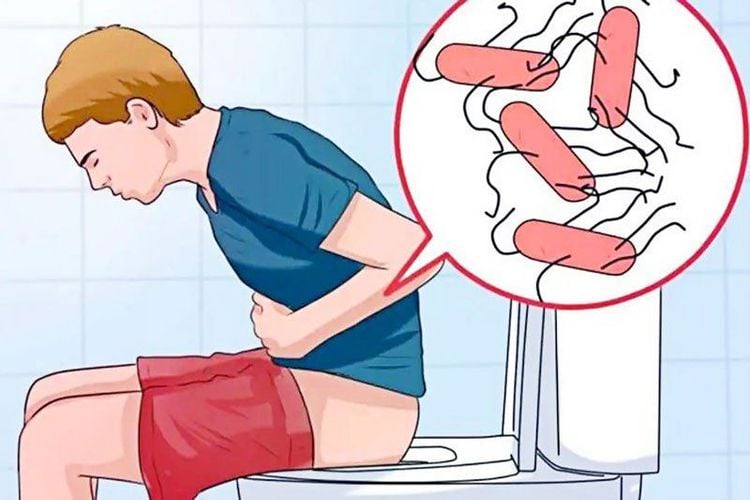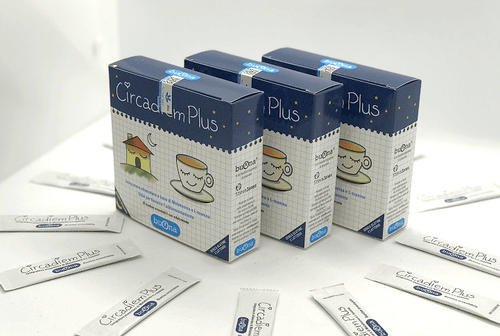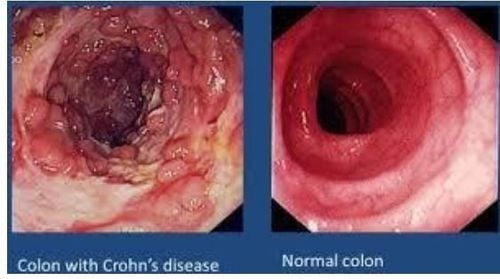This is an automatically translated article.
Article written by Master, Doctor Mai Vien Phuong - Gastroenterologist - Department of Medical Examination & Internal Medicine - Vinmec Central Park International General Hospital.
Crohn's disease may not be as well known as cancer or heart disease, but it also has the potential to take a person's life. This is a chronic inflammatory disease of the gastrointestinal tract. Stress is one of the common causes of Crohn's disease flare-ups. So, managing stress can help reduce this condition.
1. The two phases of Crohn's disease flare and remission
Most people with Crohn's disease have cycles of flare-ups and remissions. During a Crohn's flare, symptoms associated with gastrointestinal inflammation are at their worst. During the remission phase, the patient feels fairly normal again.Common symptoms of a Crohn's flare include:
Abdominal pain (often worse after meals). Diarrhea . Painful bowel movements. Go out blood. Weight loss. Anemia . Tired. Aline Charabaty, M.D., director of the Center for Inflammatory Bowel Disease at MedStar Georgetown University Hospital, says Crohn's disease can also manifest in other symptoms; such as joint pain, eye inflammation and skin lesions.

2. How does stress management help reduce Crohn's disease flares?
Crohn's disease is a painful inflammatory bowel disorder. It causes inflammation of the digestive tract and can occur anywhere from the mouth to the anus. Inflammation comes and goes in cycles. Patients will experience periods of remission and relapse for several weeks or months.Treatment is aimed at controlling pain and symptoms. But even if you're getting treatment, you're still likely to have a flare-up. It is difficult to pinpoint what causes flare-ups, but some studies suggest that stress is a common cause.
Major landmark events or everyday problems can cause stress and lead to flare-ups. For people with Crohn's disease, stress can have more of an impact on mental, emotional, and physical health.
Some people may even obsess about being stressed or worry about when symptoms might recur. This can worsen a Crohn's flare-up. Then, the stress resumes, creating a vicious cycle that keeps you in a constant state of anxiety.
Stress is a part of life, however, learning how to manage it will help you manage Crohn's disease and flare-ups.
Crohn's disease flare-ups can happen at any time. However, applying relaxation techniques will help you get them under control. Here are some methods to manage stress:
Deep breathing Focus on inhaling and exhaling. Mastering your breathing will gradually help you slow down and calm down. The Buddhist meditation method is a very useful method. Just 20 minutes each time, twice a day but at least 10 minutes each time. This is a meditation method where you will focus on regulating your breathing. Practitioners will breathe deeply and slowly, while focusing on breathing while counting each time to calm the mind. At this point, the mind follows the breath. Begin to inhale deeply through the nose, exhaling through the mouth three times. Then, breathe in through your nose, and out through your nose, count 1. Continue to breathe and count 2, 3 to 10. Then count again. Do not count below 5 and more than 10 because it is difficult to concentrate. This method helps practitioners quickly achieve a state of calm, reduce anxiety, improve concentration and emotional balance. You can use this technique anytime and anywhere.
Biofeedback Biofeedback can help you learn how to slow your heart rate and relieve muscle tension. Biofeedback therapy is available at physical and medical centers or some hospitals. There are even some devices you can buy online.
Biofeedback is a type of therapy that uses sensors attached to your body to measure key body functions. Biofeedback is meant to help you learn more about how your body works. This information can help you better control certain body functions and deal with health problems.
Biofeedback is built on the concept of “mind over matter”. That is, with the right techniques, you can change your health by paying attention to how your body responds to stressors and other stimuli.
Chronic stress can have significant effects on your body. Such as increased blood pressure, increased body temperature and disruption of brain function. These functions such as heart rate, temperature, and blood pressure are controlled involuntarily by the nervous system. For example, you don't think about making your heart beat faster. It only happens in response to your surroundings, like when you're nervous, excited, or exercising.
Biofeedback is a technique that can help patients gain more control over these involuntary functions. This method helps to harness the power of the mind. The patient will be aware of what is going on inside the body. From there, patients can partly control their own health situation.
Move and move more Go for a hike or walk around the block. A brisk walk will help you clear your mind and tone your muscles. Your lungs want some fresh air and your health improves when endorphins are activated.
Do yoga Practice yoga to develop flexibility in your body and mind. It can help boost your immune system and improve your mood. At the same time, it can also regulate your breathing, heart rate, blood pressure and hormone levels.
Meditation Meditation is a great way to relieve stress and increase mindfulness. Meditate to calm the wandering thoughts in your mind and eliminate anxiety. The sound of silence will lower your stress levels and increase your overall functioning. Your body will thank you for giving it a chance to recharge. There are many apps available that will help guide you through the meditation process.
Visualization Techniques Visualize situations and contexts that evoke tranquility. Picture yourself in a boat floating in a river or lying on an open grass field. Giving your mind a "holiday" can reduce your stress levels.
A common image to visualize is a reed in a strong wind. If the reed is hard and brittle in the wind, it will break. In contrast, the reed survives because it is flexible and adapts well to change. Just like how people deal with stressful situations. The goal of the visualization is that the reed will survive strong winds, similar to how humans survive a thunderstorm.

3. Conclusion
Managing stress is especially important if you have Crohn's disease. Although stress doesn't specifically cause Crohn's disease, it can lead to flare-ups and relapses. Managing stress is one way for you to minimize the impact of Crohn's on your life. By getting the right treatment and managing your stress levels, you can continue to live a healthy and fulfilling life.Follow the website: Vinmec.com to update more useful information.
Please dial HOTLINE for more information or register for an appointment HERE. Download MyVinmec app to make appointments faster and to manage your bookings easily.














